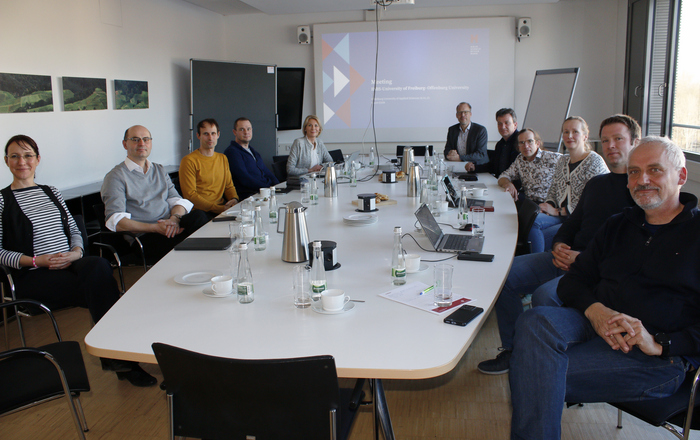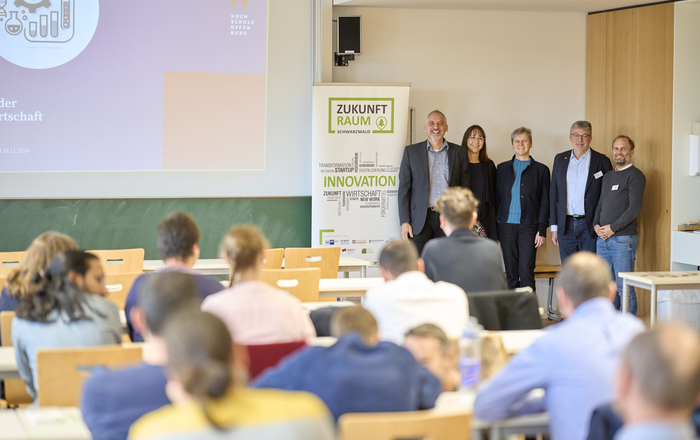Institute for Circular Bioeconomy
ICB - Institute for Circular Bioeconomy
Die zirkuläre Bioökonomie ist mehr als nur ein Trend – sie ist die Zukunft unserer Wirtschaft und leistet auf technologischer und gesellschaftlicher Ebene einen wesentlichen Beitrag zur Bewältigung der Herausforderungen des Klimawandels und der Ressourcenknappheit.
Ressourcen schonen, die Umwelt schützen, die Wirtschaft stärken sowie Kompetenzen entwickeln und fördern: Das ICB zielt darauf ab, durch die Entwicklung und Umsetzung von Lösungen für eine nachhaltige Bioökonomie einen Beitrag zu leisten. Durch die Kreislaufnutzung biologischer Ressourcen können wir
- Ressourcen schonen: Wir reduzieren den Bedarf an endlichen Rohstoffen und minimieren Abfall.
- das Klima schützen: Biobasierte Produkte können einen wichtigen Beitrag zur Reduzierung von Treibhausgasemissionen leisten.
- Umweltverschmutzung entgegenwirken: Durch die Entwicklung umweltfreundlicher Produkte und Prozesse reduzieren wir die Auswirkungen auf unsere Umwelt.
- Wertschöpfungsketten optimieren: Durch die effizientere Nutzung von Ressourcen können wir die Wettbewerbsfähigkeit unserer Partner stärken.
- Kompetenzen entwickeln: Wir fungieren als Drehscheibe für Wissenstransfer, Forschung und Ausbildung und tragen dazu bei, die notwendigen Fähigkeiten für eine nachhaltige Transformation der Wirtschaft zu fördern.
Science Bits
Unsere Kompetenzen

Unsere analytische Expertise deckt ein breites Spektrum an Anwendungen ab, die für die Förderung einer zirkulären Bioökonomie entscheidend sind. Von der Bewertung von Schadstoffen und bioaktiven Substanzen bis hin zur Verfolgung von Krankheitserregern und Pharmazeutika nutzt unser Team modernste Analysetechniken, um Wasser, Boden, Biomasse und Produkte aus thermischen, biologischen und chemischen Prozessen zu bewerten. Wir führen tiefgreifende Analysen von kleinen und großen Molekülen durch, bewerten Toxizität, screenen auf Resistenzen und liefern wichtige Erkenntnisse für die Umweltüberwachung sowie für die Entwicklung sicherer und nachhaltiger Produkte.
Kompetenzfeldverantwortliche: Prof. Dr. Melanie Broszat

Unser Kompetenzfeld Didaktik und Wissenstransfer fördert die Verknüpfung von Forschung und Lehre, um die Studierenden optimal auf die Herausforderungen auf dem Weg in Richtung einer umweltverträglicheren Zukunft vorzubereiten. Wir gewährleisten die Aktualität der Lehre durch die Einbindung neuester Forschungsergebnisse und stärken den Projektcharakter in unseren Studiengängen. Die Studierenden unserer Bachelor- (Umwelttechnologie und Biotechnologie) und Masterstudiengänge (Biotechnology und Process Engineering) haben schon während ihres Studiums die Möglichkeit, an Forschungsprojekten des ICB und damit an der Gestaltung der zirkulären Bioökonomie mitzuwirken.
Kompetenzfeldverantwortliche: Prof. Dr. Susanne Gleißle

Dieses Fachgebiet spielt eine zentrale Rolle in einem Institut für zirkuläre Bioökonomie. Es bildet die Brücke zwischen Forschung und der praktischen Umsetzung innovativer, nachhaltiger Lösungen. Es entwickelt und implementiert Prozesse zur Umwandlung von Biomasse in hochwertige Produkte. Dies umfasst die geeignete Vorbehandlung biobasierter Materialströme (z.B. durch den Einsatz von Enzymen), die Produktion in (Bio-)Reaktoren und die Aufreinigung der wertvollen Produkte. Modellbasierte Beschreibung und Simulation sowie der Einsatz von Sensoren, Automatisierung und künstlicher Intelligenz helfen Ingenieur*innen, den Prozess zu verstehen. Dies bildet die Grundlage für die anschließende Skalierung vom Labor über den Pilotmaßstab bis hin zum Produktionsmaßstab.
Kompetenzfeldverantwortlicher: Dr. Fabian Haitz

Die Enzymtechnologie ist ein Eckpfeiler unserer bioökonomischen Forschung, in der wir uns auf Enzymproduktion, Analytik und Charakterisierung konzentrieren. Unsere Projekte befassen sich mit Enzymanwendungen, einschließlich Cellulasen für die Biomasseumwandlung und Chitinases für die Bioprozessoptimierung, sowie mit Enzymen für Lebensmittel und Futtermittel. Unsere Enzymforschung untermauert den Wandel der Bioökonomie hin zu ressourceneffizienten und umweltfreundlichen Lösungen.
Kompetenzfeldverantwortlicher: Prof. Dr. Thomas Eisele

Unsere Forschung konzentriert sich auf die Optimierung mikrobieller und enzymatischer Prozesse für Anwendungen in der zirkulären Bioökonomie. Unsere Labore unterstützen jede Phase der biologischen Forschung, von der anfänglichen mikrobiellen Kultivierung bis hin zu großtechnischen Pilotversuchen. Wir sind spezialisiert auf die Produktion von Enzymen wie Cellulasen und Chitinases, um cellulose- und chitinreiche Abfallströme als wertvolle Rohstoffe wiederzuverwerten.
Unsere Bioprozessoptimierung für die Biogasproduktion zielt darauf ab, den Energieertrag zu maximieren und die Prozessstabilität zu verbessern. Darüber hinaus nutzen wir anaerobe Mischkulturen, um CO₂-Abfallströme und grünen Wasserstoff in Methan umzuwandeln und so zu nachhaltigen Energie- und Kohlenstoffmanagementlösungen beizutragen. Mikrobiomanalysen in diesem Zusammenhang liefern nicht nur Einblicke in komplexe mikrobielle Wechselwirkungen, sondern schaffen auch eine Grundlage für eine fundierte, wissensbasierte Prozessoptimierung.
Kompetenzfeldverantwortliche: Prof. Dr. Christiane Zell
Aktuelle Forschungsprojekte
Beendete Forschungsprojekte
News
Team
- 0781 205-101
- barbara.anders@hs-offenburg.de
- Raum: B052
- Badstraße 24, 77652 Offenburg
- 0781 205-4657
- heide.biollaz@hs-offenburg.de
- Raum: 3.04
- Badstraße 24, 77652 Offenburg
- 0781 205-4671
- melanie.broszat@hs-offenburg.de
- Raum: B255
- Badstr. 24, 77652 Offenburg
- Raum: B261
- Badstraße 24, 77652 Offenburg
- 0781 205-4967
- fabian.eber@hs-offenburg.de
- Raum: B255
- Badstraße 24, 77652 Offenburg
- 0781 205-4880
- thomas.eisele@hs-offenburg.de
- Raum: B258
- Badstraße 24, 77652 Offenburg
- 0781 205-4610
- jakob.faiss@hs-offenburg.de
- Raum: B252
- Badstraße 24, 77652 Offenburg
- 0781 205-4790
- susanne.gleissle@hs-offenburg.de
- Raum: B251
- Badstraße 24, 77652 Offenburg
- 0781 205-4906
- jannis.grafmueller@hs-offenburg.de
- Raum: 1.01
- Badstraße 24, 77652 Offenburg
- 0781 205-4858
- fabian.haitz@hs-offenburg.de
- Raum: B256
- Badstraße 24, 77652 Offenburg
- 0781 205-396
- almut.henninger@hs-offenburg.de
- Raum: B262
- Badstraße 24, 77652 Offenburg
- 0781 205-351
- ulrich.hochberg@hs-offenburg.de
- Raum: E403
- Badstraße 24, 77652 Offenburg
- 0781 205-4662
- barbara.kast@hs-offenburg.de
- Raum: B265
- Badstraße 24, 77652 Offenburg
- 0781 205-4634
- daniel.kray@hs-offenburg.de
- Raum: 3.04
- Badstraße 24, 77652 Offenburg
- 0781 205-4993
- joanna.lukasiewicz@hs-offenburg.de
- Raum: B261
- Badstraße 24, 77652 Offenburg
- 0781 205-4934
- vanessa.marzluf@hs-offenburg.de
- Raum: B257
- Badstraße 24, 77652 Offenburg
- 0781 205-4624
- katharina.roettele@hs-offenburg.de
- Raum: B262
- Badstraße 24, 77652 Offenburg
- 0781 205-4612
- patricia.semke@hs-offenburg.de
- Raum: B264
- Badstraße 24, 77652 Offenburg
- 0781 205-412
- sophie.stuermer@hs-offenburg.de
- Raum: B257
- Badstraße 24, 77652 Offenburg
- 0781 205-4878
- lea.wattenberg@hs-offenburg.de
- Raum: B252
- Badstraße 24, 77652 Offenburg
- 0781 205-4845
- alexander.weigand@hs-offenburg.de
- Raum: A308
- Badstraße 24, 77652 Offenburg
- 0781 205-118
- andreas.wilke@hs-offenburg.de
- Raum: B264
- Badstraße 24, 77652 Offenburg
- 0781 205-100
- christiane.zell@hs-offenburg.de
- Raum: B259
- Badstraße 24, 77652 Offenburg
- 0781 205-4931
- olga.zielinska@hs-offenburg.de
- Raum: B261
- Badstraße 24, 77652 Offenburg































